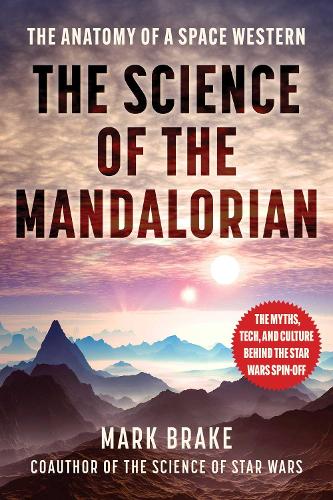
The Science of The Mandalorian: The Anatomy of a Space Western
(Paperback)
Publishing Details
The Science of The Mandalorian: The Anatomy of a Space Western
By (Author) Mark Brake
Skyhorse Publishing
Skyhorse Publishing
1st March 2024
4th January 2024
United States
Classifications
General
Non Fiction
Film history, theory or criticism
Performing arts genres: Science fiction, fantasy and horror
500
Physical Properties
Paperback
216
Width 152mm, Height 229mm, Spine 20mm
272g
Description
Take a trip beyond this Earth to explore the myths of The Mandalorian and uncover the anatomy of the newest space western in the Star Wars Universe.
Star Wars dominates the film world. The combined box office revenue of the Star Wars movies equates to over$10billion, making it thesecond-highest-grossing film franchiseof all time. But thisfranchise is no blaster from the past. Its fantastically successful films have now been followed by multiple television series set in that same galaxy far, far away. The franchises flagship television series, and likely the firmest fan favorite for some time to come, isThe Mandalorian.
Tracing the tale of the titular bounty hunter, traveling across the furthest reaches of that mythic galaxy, The Mandalorian has been greatly praised and highly acclaimed for creating characters with gravitas and originality, worlds with depth and impact, resulting in some of the best Star Wars content ever. Even though its set in deep space, The Mandalorian has as much in common with Western movies as it does with science fiction. Saloons. Bandits. Gun duels. Bounty hunters. Outlaws with a price on their heads. Space exploration as a final frontier.And a wild hero who doesnt quite belong in a lawless part of the galaxy after the fall of Empire.
The Science of The Mandaloriantakes you on a badass journey with a mysterious, lone gunfighter in the outer reaches of the galaxy, where your beskar armor will protect you from many things, but not the sight of a small, green, carnivorous humanoid with big black eyes and mysterious powers. This is The Way.
Author Bio
Mark Brake developed the worlds first science and science fiction degree in 1999 and launched the worlds first astrobiology degree in 2005. Hes communicated science through film, television, print, and radio on five continents, including for NASA, Seattles Science Fiction Museum, the BBC, the Royal Institution, and Sky Cinema. Markalso tours Europe with Science of Doctor Who, Science of Star Wars, and Science of Superheroes road shows.
